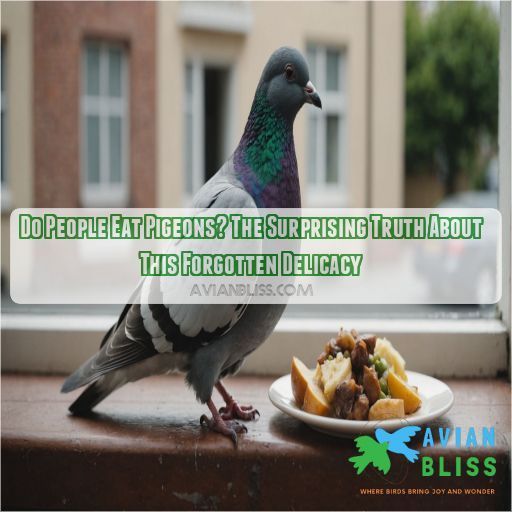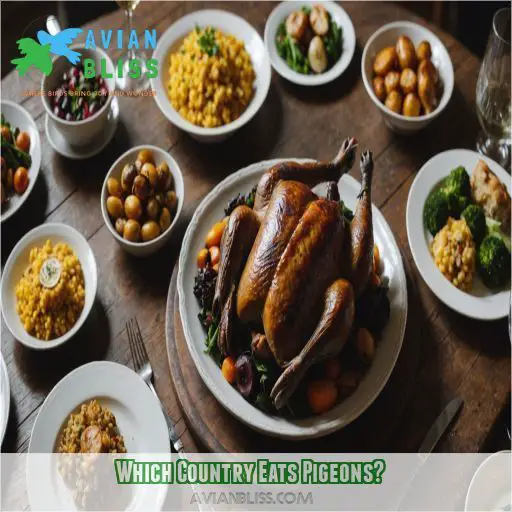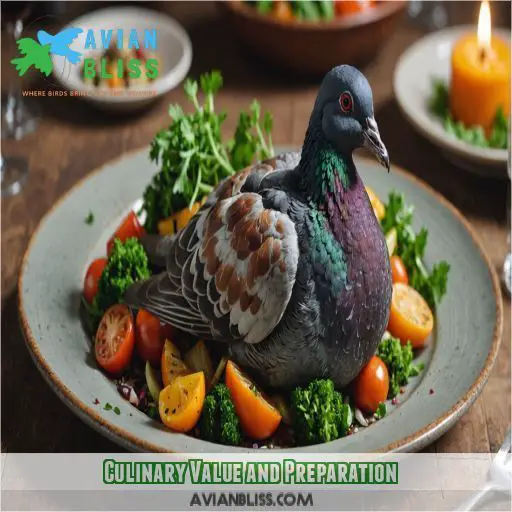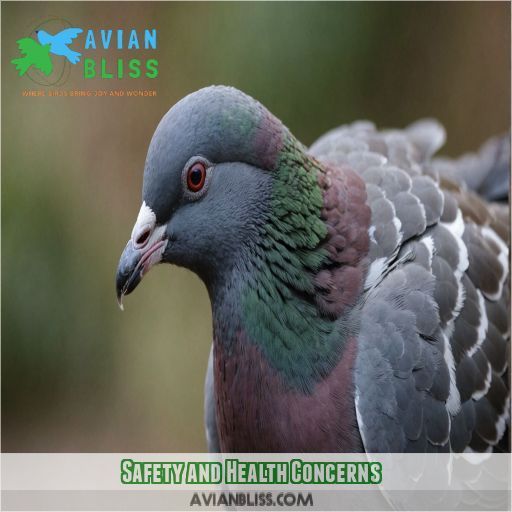This site is supported by our readers. We may earn a commission, at no cost to you, if you purchase through links.

In many cultures, pigeon meat, also known as squab, is a delicacy.
It’s typically harvested from young pigeons and has a unique flavor profile that’s often compared to a mix of duck and steak.
While it’s not a common protein source in the US, Pigeon Meat is enjoyed in many countries, including China and Morocco.
And, fun fact, it’s even gaining popularity in Asian markets as a sustainable protein source.
Table Of Contents
- Key Takeaways
- What is Pigeon Meat Called?
- Which Country Eats Pigeons?
- History of Pigeon Meat Consumption
- Pigeon Farming and Production
- Culinary Value and Preparation
- Market Demand and Regulations
- Safety and Health Concerns
- Hunting and Preparing Pigeons
- Feeding and Caring for Pigeons
- Frequently Asked Questions (FAQs)
- Which country eats pigeons?
- What is pigeon meat called?
- Do people still eat pigeon pie?
- Do French people eat pigeons?
- Is it legal to hunt pigeons in urban areas?
- How does pigeon meat compare to other game birds?
- Can pigeons be raised for meat in backyard farms?
- Are there any cultural taboos surrounding pigeon consumption?
- Can pigeon meat be used as a substitute in recipes?
- Conclusion
Key Takeaways
- You might be surprised to learn that people do eat pigeons, and it’s actually a delicacy in many cultures, particularly in France, China, and Morocco, where it’s considered a luxury food and is often served in upscale restaurants.
- Pigeon meat, also known as squab, has a unique flavor profile that’s often compared to a mix of duck and steak, and is prized for its tender and juicy texture, making it a game-changer in the culinary world.
- While it’s not a common protein source in the US, pigeon meat is gaining popularity in Asian markets, particularly in China and Hong Kong, where it’s driven by cultural consumption patterns and demand for sustainable, exotic protein sources.
- If you’re thinking of trying pigeon meat, you’ll want to prioritize your health and safety by handling pigeons with care, cleaning and preparing them properly, and cooking them thoroughly to avoid disease risks and foodborne illness.
What is Pigeon Meat Called?
You might be surprised to learn that pigeon meat is actually a delicacy in many cultures, and it’s commonly known as squab. This fancy-sounding term refers specifically to the meat of young pigeons, which is prized for its unique flavor and tender texture.
Pigeon Meat Known as Squab
You might be surprised to learn that pigeon meat is commonly known as squab. It’s a delicacy in many cultures, and its unique flavor profile is gaining popularity worldwide. So, what exactly is squab, and why is it so sought after?
Squab Meat Comes From Young Pigeons
You’re now in on a little secret: squab meat comes from young pigeons, typically harvested when they’re around 4-5 weeks old. At this tender age, they weigh about 1 pound, making them a sought-after delicacy in many culinary traditions.
Squab is a Delicacy in Many Cultures
You’re about to discover that squab is a delicacy in many cultures! This luxury food has been savored for centuries, and its cultural significance runs deep. Here are 4 ways squab is enjoyed around the world:
- Pan-roasted in French cuisine
- Fried in Chinese cuisine
- Used in pastillas in Moroccan cuisine
- Grilled in traditional American recipes
Which Country Eats Pigeons?
You might be surprised to learn that people in many countries, including the United States, China, and Morocco, enjoy pigeon meat as a delicacy. From upscale restaurants in Asia to traditional dishes in France, pigeon meat is a sought-after ingredient, and its popularity is on the rise.
Pigeon Meat Consumption in the United States
You might wonder, do Americans still eat pigeons? Historically, pigeon meat was a common protein source in the US, but its popularity declined with the rise of factory-farmed chicken. Today, pigeon meat is mostly sought after by upscale restaurants and adventurous eaters.
Pigeon Meat Popularity in Asian Markets
You might be surprised to learn that pigeon meat is gaining popularity in Asian markets, particularly in China and Hong Kong. The pigeon trade is driven by cultural consumption patterns and demand for sustainable, exotic protein sources.
Pigeon Meat in French, Chinese, and Moroccan Cuisine
You’re probably wondering how pigeon meat is prepared in different cultures. In French cuisine, squab is often pan-roasted, while in Chinese cuisine, it’s typically fried. Moroccan cuisine uses pigeon meat in pastillas, a slow-cooked dish. Here are 4 ways pigeon meat is enjoyed globally:
- French: Pan-roasted squab with herbs
- Chinese: Crispy fried squab with vegetables
- Moroccan: Slow-cooked pigeon pastillas with spices
- Global: Grilled pigeon skewers with chimichurri sauce
History of Pigeon Meat Consumption
You might be surprised to learn that pigeon meat was once a staple in many American households, particularly before the 20th century. In fact, the passenger pigeon, which is now extinct, was a common source of protein in the United States until its population declined drastically due to overhunting and deforestation.
Pigeon Meat as a Common Protein Source
You might be surprised to learn that pigeon meat was once a common protein source in the United States. In fact, it was a staple until the last century, when chicken became the leading source of poultry, eclipsing pigeon meat’s popularity.
Extinction of the Passenger Pigeon
You see, the passenger pigeon‘s demise was a real game-changer. Habitat loss and overhunting led to its extinction in 1914. Ironically, the pigeon’s love for fruits and veggies wasn’t enough to save it from humans’ unsustainable hunting practices.
Decline of Pigeon Meat Consumption
You might wonder, what led to the decline of pigeon meat consumption? Well, it’s quite simple: the rise of chicken farming, pest control measures, and cultural shifts all played a role in making pigeon meat less desirable, post-passenger pigeon extinction.
Pigeon Farming and Production
You might be surprised to learn that pigeon farming is a thing.
It’s actually a challenging and labor-intensive process due to the birds’ slow reproductive rate.
A pair of pigeons produces only two babies every 45 days.
To meet the growing demand for squab, farmers like Curtis Fagan have developed creative methods.
These methods include using backyard lofts with makeshift homes made from buckets to raise these unique birds.
Challenges of Mass Producing Pigeons
You’re probably wondering why pigeon meat isn’t as common as chicken. The thing is, pigeons have a slow breeding cycle, producing only two babies every 45 days, making mass production a challenge, especially with high feed costs and housing requirements.
Pigeon Farming Techniques and Methods
As a pigeon farmer, you’ll want to master Pigeon Health Management and Breeding Techniques to keep your birds thriving. Design a cozy loft, formulate a nutritious feed, and perfect Squab Production Methods to raise happy, healthy birds – no matter if they’re pets or performers.
Palmetto Pigeon Plant and Curtis Fagan’s Farming Methods
You’re probably wondering how pigeon farming works. Take Palmetto Pigeon Plant, the largest squab producer in the US, which aims to sell 40,000-50,000 squab per month. Meanwhile, Curtis Fagan uses a backyard loft with makeshift homes made from buckets.
Culinary Value and Preparation
You might be surprised to learn that pigeon meat, also known as squab, has a unique flavor profile that’s often compared to a mix of duck and steak. When cooked, squab can be pan-roasted to perfection, and its young age at slaughter gives it a tender and juicy texture that’s a delicacy in many cultures.
Unique Flavor Profile of Squab
You’re in for a treat! Squab’s unique flavor profile is a game-changer. Here’s what sets it apart:
- High concentration of myoglobin, giving it a rich, savory taste
- Young age at slaughter, resulting in tender meat
- Often compared to a mix of duck and steak
Cooking Methods for Squab and Pigeon Meat
Now that you know about squab’s unique flavor profile, let’s get cooking! You can pan-roast squab like the French, fry it like the Chinese, or slow-cook it in Moroccan pastillas. Here are some popular squab recipes:
| Squab Recipe | Ingredients | Cooking Method |
|---|---|---|
| Pan-Roasted Squab | Squab, butter, herbs | Pan-roasting |
| Crispy Fried Squab | Squab, flour, eggs, breadcrumbs | Deep-frying |
| Moroccan Pastillas | Squab, spices, onions, pastry | Slow-cooking |
Try experimenting with different pigeon marinades and seasonings to find your favorite squab dish!
Comparison of Squab and Dove Meat
Now that you’ve mastered cooking squab, let’s talk turkey – or rather, dove. Dove meat tastes similar to duck, but can be tougher and oilier than chicken. It’s also generally cheaper than squab, with a more robust flavor and coarser texture.
Market Demand and Regulations
You might be surprised to learn that people do eat pigeons, and the demand for pigeon meat is actually on the rise, driven by Asian markets and upscale restaurants. However, before you consider giving it a try, you must understand the regulations and safety precautions surrounding pigeon hunting and consumption for a safe and enjoyable experience.
Increasing Demand for Pigeon Meat
You might be surprised to learn that pigeon meat is gaining popularity. Here are 4 key drivers behind the trend:
- Growing demand from Asian markets
- Increasing popularity in upscale restaurants
- Celebrity chef endorsements
- Stagnated supply meets rising demand
Regulations on Pigeon Hunting and Consumption
If you’re thinking about pigeon hunting and eating them, the rules are different everywhere. In Calgary, for instance, you can catch and eat pigeons, but you’ll need to follow specific bylaws regarding firearms and permits. Pigeon meat regulations can be a real puzzle!
Safety Concerns and Precautions
When it comes to pigeon meat, safety concerns are paramount. You don’t want to risk lead poisoning or disease. To enjoy squab safely:
- Handle pigeons with care to avoid disease risks
- Clean and prepare pigeons properly
- Cook pigeon meat thoroughly
- Avoid eating street pigeons due to lead exposure
- Follow proper cooking methods to prevent foodborne illness
Safety and Health Concerns
As you consider trying pigeon meat, it’s important to think about the potential health risks – after all, these birds have a reputation for pecking at trash and carrying diseases. While farmed pigeons are generally safe to eat, eating street pigeons can be a recipe for disaster, so it’s important to understand the importance of proper preparation and cleaning.
Risks of Eating Street Pigeons
Eating street pigeons poses serious health risks to you. These birds often carry disease and parasites, having fed on garbage contaminated with toxins like lead. Consuming them can lead to serious illness, making it essential to prioritize your health and safety.
Importance of Proper Preparation and Cleaning
Now that you know the risks of eating street pigeons, let’s talk about the importance of proper preparation and cleaning. When handling pigeons, safety is key. Remove feathers carefully, clean thoroughly to avoid bacterial contamination, and maintain good kitchen hygiene practices.
Health Benefits and Risks of Pigeon Meat Consumption
In the case of pigeon meat, you might be wondering about the health benefits and risks. While it’s packed with protein and iron, there are concerns about food safety and disease risks, so proper handling and cooking are essential to reap its nutritional rewards.
Hunting and Preparing Pigeons
You’re about to discover the not-so-glamorous side of pigeon cuisine – namely, how to catch, kill, and prepare these birds for the table. From BB pistols to crossbows, and from skinning to gutting, we’ll walk you through the nitty-gritty of hunting and preparing pigeons, so you can decide if this forgotten delicacy is worth the fuss.
Methods for Catching and Killing Pigeons
In the matter of catching pigeons, you’ve got options: netting, baiting and trapping, or snaring. For a quick kill, consider a spring-loaded BB pistol or air rifle – just remember to prioritize safety and aim for a humane shot.
Preparing and Cleaning Pigeons for Consumption
Preparing pigeons for consumption requires some finesse. You’ll need to pluck, gut, and skin the bird. Start by holding the pigeon firmly, then carefully cut around the anus and genital area to avoid contaminating the meat. Next, gut and clean the cavity.
Cooking and Recipes for Pigeon Meat
You’ve caught and cleaned your pigeon – now it’s time to cook! Try pan-roasting squab with a cherry compote or pairing dove meat with earthy mushrooms. For a Moroccan twist, slow-cook pigeon in a rich pastilla with spices and dried fruits.
Feeding and Caring for Pigeons
As you consider raising pigeons for their meat, you’ll need to think about their diet and living conditions to make sure they’re healthy and thriving. By providing a balanced diet, fresh water, and proper care, you can help your pigeons grow strong and flavorful, making them a delicious and sustainable source of protein.
Diet and Nutrition for Pigeons
Now that you’re interested in raising pigeons, let’s talk about their diet. To keep your pigeons healthy, you’ll want to provide a balanced mix of grains, proteins, and veggies. Here are some key things to keep in mind:
- Offer a variety of seed types, like millet, sunflower seeds, and cracked corn
- Supplement with fruits and leafy greens for extra nutrients
- Consider adding mineral supplements to support digestive health
Importance of Fresh Water and Gravel
As you care for your pigeons, remember that fresh water is essential – change it daily to keep them healthy! Also, provide grit or gravel to help with digestion, as pigeons need it to break down seeds and grains properly.
Tips for Raising and Keeping Pigeons
To raise happy pigeons, make certain your loft is well-ventilated and predator-proof. Perform regular health checks, provide a balanced diet, and consider breeding tips from experts. You can also train your pigeons using reward-based methods to keep them healthy and engaged.
Frequently Asked Questions (FAQs)
Which country eats pigeons?
Coincidentally, you’re wondering which country eats pigeons? Well, you’ll find pigeon dishes in many countries, but they’re particularly popular in France, China, and Morocco, where they’re considered a delicacy and are often served in upscale restaurants.
What is pigeon meat called?
You’re curious about pigeon meat! It’s commonly called squab, which refers to the young pigeon, typically harvested at 4-5 weeks old. Squab is prized for its tender, flavorful meat and is often used in high-end cuisine.
Do people still eat pigeon pie?
You might be surprised, but yes, people still eat pigeon pie, although it’s not as popular as it once was. In some cultures, like Moroccan and French cuisine, pigeon pie, also known as b’stilla, is still a beloved dish (Source).
Do French people eat pigeons?
You’re probably thinking of the French delicacy, "pigeonneau" – a young pigeon dish. Yes, the French do eat pigeons, often pan-roasting them to bring out the unique flavor, reminiscent of a duck-steak hybrid.
Is it legal to hunt pigeons in urban areas?
When hunting pigeons in urban areas, you’ll need to check local laws, as they vary widely – some cities allow it, while others prohibit it or require permits (Source).
How does pigeon meat compare to other game birds?
Eating pigeon meat is like discovering a hidden gem – it’s a game-changer! Compared to other game birds, pigeon meat has a unique flavor profile, with a tender and juicy texture, similar to duck, but with a slightly sweet twist.
Can pigeons be raised for meat in backyard farms?
You can raise pigeons for meat in backyard farms, but it’s really important to follow best practices, ensuring a clean and healthy environment, proper nutrition, and humane treatment (Source).
Are there any cultural taboos surrounding pigeon consumption?
You might be surprised to learn that cultural taboos surrounding pigeon consumption are relatively rare, but they do exist. In some societies, pigeons are seen as pests or carriers of disease, making them unappealing as a food source .
Can pigeon meat be used as a substitute in recipes?
The ultimate culinary rebel, you want to know if pigeon meat can be a recipe substitute? Well, irony alert: the bird once considered a pest can indeed replace chicken or duck in many dishes, thanks to its unique flavor profile.
Conclusion
Imagine walking through a bustling market, the aroma of exotic spices and fresh meat filling the air.
Suddenly, you stumble upon a vendor selling succulent pigeon dishes, and your curiosity is piqued.
As you savor the flavor, you realize that, yes, people do eat pigeons!
From China to Morocco, pigeon meat, or squab, is a delicacy enjoyed worldwide.












